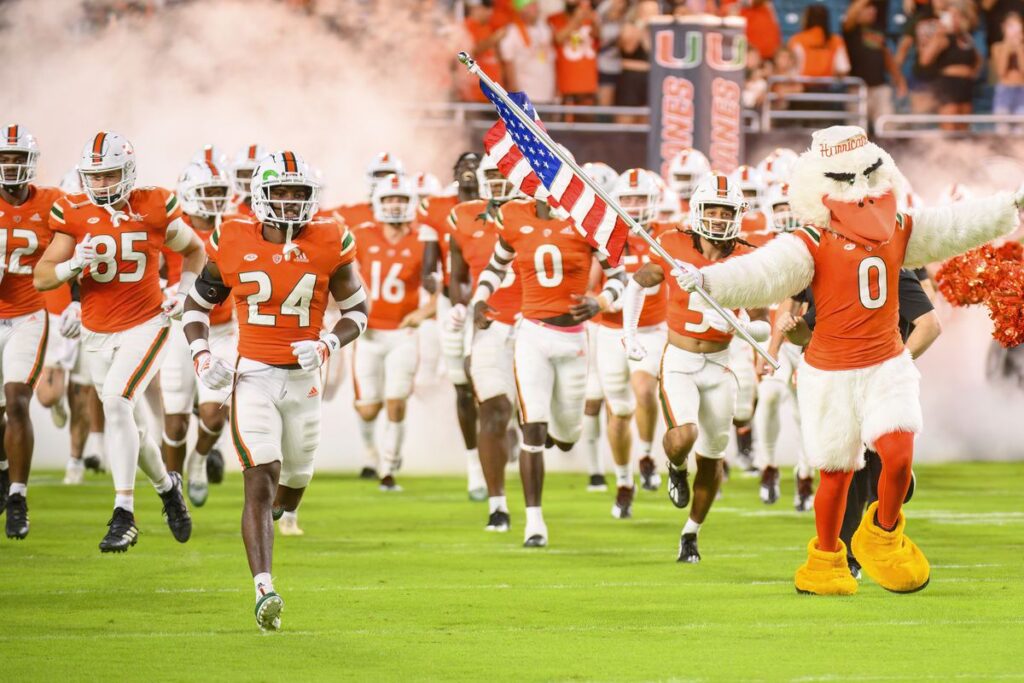Team History
The Miami Hurricanes football program boasts a storied tradition, marked by periods of dominance, thrilling victories, and larger-than-life personalities. From their humble beginnings to their ascent to national prominence, the Hurricanes have etched their name into college football lore. Their swagger and relentless pursuit of championships have made them one of the most iconic and polarizing teams in the sport.
The program’s history is a tapestry of triumphs and challenges. It’s a story defined by legendary coaches, unforgettable players, and moments etched into the annals of sports. The Hurricanes’ identity is inextricably linked to their city, reflecting the audacious and vibrant spirit of Miami itself.
Foundation and Early Years
The University of Miami football program officially launched in 1926, taking its first tentative steps onto the gridiron. During these early years, the Hurricanes strived for recognition, experiencing the growing pains common to fledgling teams. Players donned green and orange uniforms—the school’s original colors—and their on-field results were mixed. The fledgling program often competed against local high schools and junior colleges as they aimed to build a foundation.
Despite the numerous challenges, the Hurricanes persevered. They steadily built their program, facing adversity with the resilience that would become a hallmark of the team. Miami’s early years represent the building blocks upon which the program’s future success was constructed.
Notable Early Achievements
Despite their modest beginnings, the Hurricanes did achieve some early milestones that foreshadowed their potential. In 1937, Miami played its first game against a fellow Florida university and defeated the Florida Gators. This victory fueled local rivalries and ignited the program’s competitive spirit. Another landmark arrived in 1950 when Andy Gustafson became head coach. Under his leadership, the Hurricanes moved to the upper echelon of college football and enjoyed their first bowl appearances.
These early achievements, even amid seasons of inconsistent performance, demonstrated the Hurricanes’ burgeoning potential. They served as a stepping stone, proving that a program from a relatively young university in Miami could compete against established football powerhouses.
Periods of Change
The decades following World War II were a time of growth and change for the University of Miami and its football program. As the university focused on academic expansion and prominence, the football program also experienced shifts in both leadership and identity. The Hurricanes endured some challenging seasons as well as moments of resurgence. Yet, even during these periods of change, the foundation was being laid for Miami’s eventual rise to dominance.
The 1970s marked a particularly turbulent era for the Hurricanes, defined by coaching transitions and a search for a consistent winning formula. However, these years also saw the emergence of talented athletes who would pave the way for the Hurricanes’ ascension in the 1980s.
Championships and Achievements
The 1980s marked a golden age for Miami Hurricanes football. Coach Howard Schnellenberger ignited a dynasty, building a roster overflowing with talent and an audacious attitude that both exhilarated and angered fans nationwide. The Hurricanes won their first national championship in 1983 and proceeded to secure four more in 1987, 1989, 1991, and 2001. Throughout the 80s, 90s, and early 2000s, the program consistently churned out NFL stars and thrilled audiences with their high-octane play and undeniable swagger.
In addition to their national championships, the Hurricanes have captured numerous conference titles and participated in prestigious bowl games. The program has produced Heisman Trophy winners, All-Americans, and a legion of NFL standouts. Miami’s legacy of excellence stands as a testament to its relentless pursuit of greatness.
Current Roster
While the Hurricanes haven’t claimed a national title in recent years, they remain a program on the upswing. The current roster boasts an array of dynamic playmakers both on the offensive and defensive sides of the ball. [Here, insert a few key players and their positions for the current season]. These young stars are determined to restore Miami to its former glory and re-establish the Hurricanes as a force within the Atlantic Coast Conference.
The current roster also showcases Miami’s strong recruiting prowess. The Hurricanes consistently attract top talent from across the nation, particularly from the fertile recruiting grounds of Florida. This influx of talented players fuels optimism for the future of the program.
Management and Coaching Staff
The Miami Hurricanes are led by head coach Mario Cristobal, a former Hurricane player and one of the most respected coaches in college football. Cristobal’s vision is to return Miami to national prominence, instilling a culture of discipline and toughness. He assembles a talented coaching staff composed of seasoned veterans and rising stars in the profession, bringing expertise in all areas of the game.
Home Stadium Information
The Hurricanes play their home games at the iconic Hard Rock Stadium in Miami Gardens, Florida. This state-of-the-art stadium has hosted numerous Super Bowls and high-profile college football games, providing a fitting stage for the Hurricanes. Known for its passionate fanbase and electric atmosphere, Hard Rock Stadium is a key part of the Miami Hurricanes’ home-field advantage, where “The U” thrives on creating a raucous environment for opposing teams.
-
*********** ***** ******* *** ***** ** ************ **** ********* *****dd.mm.yyyy 00:00 PM
-
****** *********** **** ** ***** ****** *** **** *** ******: ********* *** ******* *** ****'* ****dd.mm.yyyy 00:00 PM
-
*********-***** ********: **** 6 **** *** ***** *** * ********* **** 7dd.mm.yyyy 00:00 PM
-
**********-************ *******: ****** ****ć, ******* *******, *** * ********* ********** ********dd.mm.yyyy 00:00 PM
-
********* **** ********* ** *** ***: ********* *** ********* ** ****** ******** **. *** *** *****dd.mm.yyyy 00:00 PM
-
****************** ******* **********: *** ********' **** ****dd.mm.yyyy 00:00 PM







